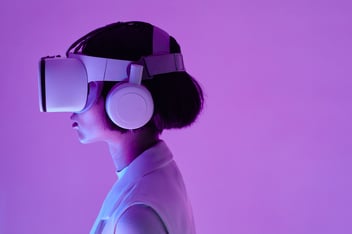What are the applications of artificial intelligence in different business sectors? We explain it through 5 examples!
How do companies apply artificial intelligence? As an abstract technology with a large number of possible applications, it is sometimes difficult to understand the scope of artificial intelligence. In this article we explore 5 different examples of how artificial intelligence can be applied in different industries.

Since its official debut in 1956 — year in which John McCarthy first uttered the word— artificial intelligence has evolved a lot. Not only the technology itself, but also its scope, both in business and in many other spheres of our daily lives.
Nowadays, artificial intelligence plays a key role in business and is one of the technologies in which companies will invest the most in the coming years. According to predictions, the global AI market will reach $641 billion by 2028.
However, despite the clear benefits of artificial intelligence in business, many people still struggle to understand the concept and don't know exactly what it is, what it does and what it is used for. Because it is an abstract technology with so many ramifications —bots, machine learning, folksonomy, etc.— it is difficult to create a mental map of what artificial intelligence is and how we can apply it to optimise our business performance.
For all these, below we explain some of the most common uses of AI in business through 5 examples from different business sectors.
5 examples of artificial intelligence in business
1. Artificial intelligence in the entertainment industry
Las aplicaciones de la IA en el sector del entretenimiento son tantas que sería imposible nombrarlas todas. El reconocimiento facial, la realidad virtual y la realidad aumentada para la creación de experiencias inmersivas, la filmación de seguimiento, etc.
There are so many applications of AI in the entertainment industry that it would be impossible to name them all. Facial recognition, virtual reality and augmented reality for the creation of immersive experiences, tracking footage, and so on.
However, one of the most celebrated examples of artificial intelligence in the entertainment industry is definitely Netflix's algorithm.
Netflix is not the leading streaming platform by chance, and it has one of the best recommendation algorithms. The platform uses machine learning algorithms to make personalised recommendations that produce an annual value of $1 billion in customer retention. In addition, statistics indicate that 80% of the platform's views come from recommendations.
2. Artificial intelligence in the automobile sector
The automotive industry is one of the business sectors that most uses artificial intelligence. Not only is the automotive industry one of the pioneers in the application of AI, but the technology is already part of the DNA of companies in the sector.
Perhaps the clearest example of the application of AI in the automotive sector is the use of robots on assembly platforms. It is already common to see robots doing tasks that used to be done by humans, such as moulding blocks of aluminium into a vehicle, painting a car, welding parts, and so on.
Beyond that, another of the most important impacts of artificial intelligence on the industry is assisted driving. AI algorithms are already being applied to make cars recognise objects. For example, all modern cars already include parking assistance, and when the vehicle comes too close to an object, the car warns us. In the future, assisted driving is expected to be increasingly used to promote driving safety and reduce the number of road accidents.
3. Artificial intelligence in healthcare
Healthcare is another of the industries that most benefits from artificial intelligence. In the field of pharmacology, AI is already widely used in the production of medicines and the development of vaccines and other drugs. In the field of surgery, it can be found in robot-assisted surgery.
On the other hand, we cannot ignore the impact of folksonomy on clinical research. Folksonomy is a technology that makes it possible to analyse texts in natural language and work with unstructured data, allowing medical staff to automate documentation processes and analyse data to discover previously unknown information.
At Bismart, as a Microsoft Power BI partner company, we have our own folksonomy solution: Folksonomy Text Analytics, which has been applied in numerous projects in collaboration with renowned medical centres.
Are you interested in folksonomy? Discover Folksonomy Text Analytics!
4. Artificial intelligence in the manufacturing industry
AI has been a major breakthrough for the manufacturing sector, greatly simplifying work and improving the accuracy of operations. Artificial intelligence also allows companies in the sector to better schedule stock, detect and avoid errors, solve problems faster and, in general, greatly improve the entire process.
5. Artificial intelligence in marketing
Latest investigations point out that marketing will be one of the business activities that will evolve the most thanks to artificial intelligence in the next few years.
It is already now being used to automate content generation, as well as to optimise customer data collection. However, one of its most promising applications is, again, personalised content, recommendations and experiences.
Marketing is one of the business areas that has a most direct relationship with customers. In this sense, AI plays a key strategic role as marketing, especially digital marketing, is moving towards communication and experiences adapted to consumer preferences.
Conclusion
It is clear that artificial intelligence has transformed business in many ways. Although in its early days many feared it would replace human intelligence, over time AI has proven to bring great benefits both in business and in many other aspects of our lives.
Check out how Bismart Folksonomy Text Analytics works through its demo!



